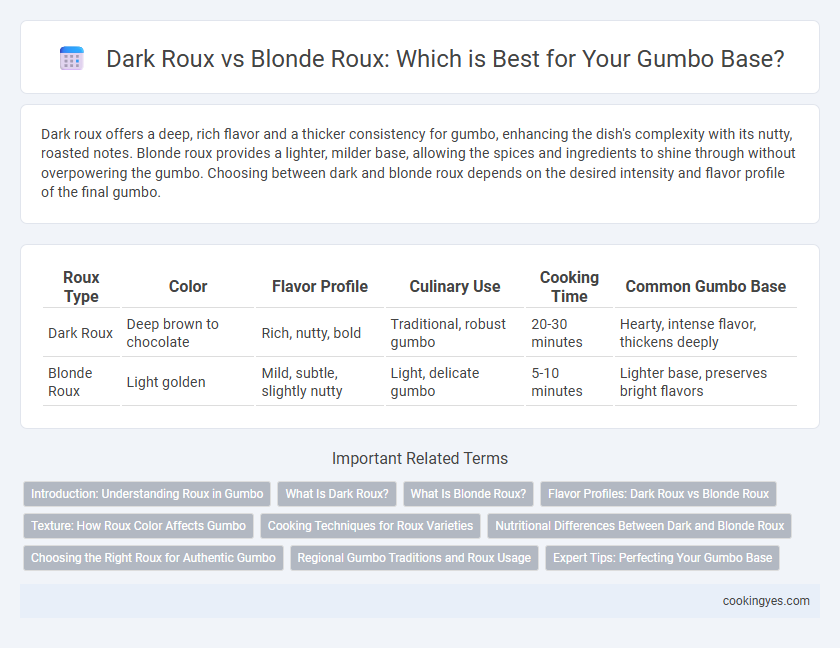Dark roux offers a deep, rich flavor and a thicker consistency for gumbo, enhancing the dish's complexity with its nutty, roasted notes. Blonde roux provides a lighter, milder base, allowing the spices and ingredients to shine through without overpowering the gumbo. Choosing between dark and blonde roux depends on the desired intensity and flavor profile of the final gumbo.
Table of Comparison
| Roux Type | Color | Flavor Profile | Culinary Use | Cooking Time | Common Gumbo Base |
|---|---|---|---|---|---|
| Dark Roux | Deep brown to chocolate | Rich, nutty, bold | Traditional, robust gumbo | 20-30 minutes | Hearty, intense flavor, thickens deeply |
| Blonde Roux | Light golden | Mild, subtle, slightly nutty | Light, delicate gumbo | 5-10 minutes | Lighter base, preserves bright flavors |
Introduction: Understanding Roux in Gumbo
Dark roux and blonde roux serve distinct roles as the foundational thickening agents in gumbo, each imparting unique flavors and textures. Dark roux is cooked longer, developing a deep, rich color and robust, nutty taste that enhances the gumbo's complexity, while blonde roux offers a milder flavor and lighter consistency suitable for delicate versions. Mastering the differences between dark and blonde roux is essential for crafting authentic gumbo that balances depth and subtlety in its base.
What Is Dark Roux?
Dark roux is a deeply browned mixture of flour and fat, cooked slowly to develop a rich, nutty flavor and dark chocolate color essential for authentic gumbo. It provides a robust, slightly bitter base that enhances the complexity and depth of gumbo, distinguishing it from the milder, nuttier taste of blonde roux. The extended cooking process caramelizes the flour's natural sugars, creating the signature earthiness that is foundational to traditional Louisiana gumbo recipes.
What Is Blonde Roux?
Blonde roux is a mixture of equal parts flour and fat cooked until it reaches a light tan color, offering a nutty flavor and moderate thickening power essential for a balanced gumbo base. Unlike dark roux, which is cooked longer to develop a deep, smoky taste, blonde roux provides a more delicate aroma and subtle thickening, ideal for lighter gumbo varieties. This lighter roux is preferred in traditional seafood gumbo recipes to enhance flavor without overpowering the dish's other ingredients.
Flavor Profiles: Dark Roux vs Blonde Roux
Dark roux offers deep, rich, and nutty flavors with a slightly bitter undertone that intensifies the gumbo's complexity and color. Blonde roux provides a lighter, milder taste with a subtle toasted flavor, allowing other ingredients like seafood or chicken to shine without overwhelming them. Choosing between dark and blonde roux directly influences the gumbo's overall taste, balancing robustness with delicacy depending on the desired flavor profile.
Texture: How Roux Color Affects Gumbo
Dark roux imparts a deep, rich flavor to gumbo but results in a thinner texture due to the longer cooking time which breaks down starches more extensively. Blonde roux offers a lighter, nuttier taste and contributes a thicker, silkier consistency, enhancing the gumbo's body. The choice between dark and blonde roux significantly influences the gumbo's mouthfeel and overall texture, balancing richness and thickness.
Cooking Techniques for Roux Varieties
Dark roux, cooked slowly over low heat until it reaches a deep chocolate color, provides a rich, nutty flavor essential for authentic gumbo bases, while blonde roux requires a shorter cooking time at medium heat to achieve a lighter, toasted flavor ideal for delicate seafood gumbos. Mastery of temperature control and continuous stirring prevents scorching in both roux varieties, preserving their smooth texture and robust taste. Choosing between dark and blonde roux depends on the intended gumbo taste profile, with dark roux contributing depth and complexity, and blonde roux lending subtlety and a thinner consistency.
Nutritional Differences Between Dark and Blonde Roux
Dark roux contains more Maillard reaction compounds, which may reduce antioxidant levels compared to blonde roux, resulting in a lower retention of some heat-sensitive nutrients. Blonde roux has a higher carbohydrate content and slightly more calories due to less caramelization, providing a milder flavor with a lighter nutritional profile. The fat content remains similar between both types, but the degree of browning in dark roux can affect digestibility and antioxidant availability in the gumbo base.
Choosing the Right Roux for Authentic Gumbo
Dark roux offers a deep, smoky flavor essential for authentic Creole gumbo, while blonde roux provides a milder, nuttier base ideal for Cajun-style gumbo with a lighter texture. Choosing the right roux depends on the desired richness and complexity; dark roux requires careful cooking to avoid bitterness, whereas blonde roux allows for faster preparation and a subtler taste. Mastery in balancing roux color and spice levels ultimately defines the gumbo's traditional authenticity and regional character.
Regional Gumbo Traditions and Roux Usage
Dark roux, integral to Cajun gumbo from southwestern Louisiana, delivers a rich, smoky depth achieved by cooking flour and fat until deep brown, balancing bold flavors with slightly bitter undertones. Blonde roux, favored in Creole gumbo around New Orleans, offers a lighter, nuttier base by cooking the mixture to a golden hue, enhancing delicate seafood and vegetable ingredients without overpowering them. Regional gumbo traditions dictate roux choice: dark roux complements hearty, rustic dishes in Cajun cuisine, while blonde roux supports the refined, intricate flavor profiles characteristic of Creole cooking.
Expert Tips: Perfecting Your Gumbo Base
Dark roux provides a richer, deeper flavor essential for traditional Creole gumbo, offering a robust, slightly smoky taste that intensifies with a slow, careful cooking process. Blonde roux, cooked for a shorter time, yields a lighter, nuttier base ideal for seafood or chicken gumbo, preserving more delicate flavors without overwhelming the dish. Experts recommend monitoring roux color closely and stirring constantly to prevent burning, ensuring the perfect consistency and flavor balance for your gumbo base.
Dark Roux vs Blonde Roux for Gumbo Base Infographic

 cookingyes.com
cookingyes.com